Dental Implants Richardson
Applying Modern Techniques for Tooth Replacement

Traditional dentures and bridges are capable of replacing missing teeth, but because they only restore the visible surface of teeth, they don’t always meet the aesthetic and functional expectations that patients have. Dental implants in Richardson are able to replace both roots and biting surfaces of any number of teeth, allowing for a lifelike look and feel that patients feel happy with. Our team at the Richardson Oral Surgery Center welcomes referrals from general dentists as well as individual patients who would like to schedule their own consultation to learn more about the treatment.
Why Choose Richardson Oral Surgery Center for Dental Implants?
- State-of-the-Art Dental Technology for Precise Placement
- Member of the American Academy of Implant Dentistry
- Complimentary Exam, X-Ray & CBCT Scan
What Are Dental Implants?

Dental implants are small posts made of biocompatible materials, like titanium, that are surgically placed below the gumline and into the jawbone to restore the roots of missing teeth. Due to their biocompatibility, they fuse with the jawbone through a process called osseointegration, providing a strong and unwavering foundation for any type of prostheses to be attached to. The result is custom-crafted replacement teeth that serve both aesthetic and functional purposes.
The 4-Step Dental Implant Process

Throughout his 20 years of experience, Dr. Ahn has placed over 10,000 dental implants and has completed countless hours of advanced education and specialized training. Because of this, he has created a streamlined, yet personalized, process that allows patients to get the most convenient, highest quality care. Typically, each treatment will include these four main steps: an initial consultation, the implant placement surgery, osseointegration, and restoration. Continue reading below to learn more about each step.
Initial Dental Implant Consultation

During your initial consultation, our team will:
- Perform a thorough examination of your mouth.
- Learn about your medical history.
- Capture X-ray images or take a CBCT scan.
- Answer any questions you have about the treatment.
Based on the information we gather during this initial consultation, we can determine if you are eligible to move forward with dental implants right away, or if you need some preliminary procedures, such as a bone graft. We can also start to plan the details of the rest of your treatment journey.
This first appointment can also be used to make sure you understand the financial aspect of your recommended treatment plan.
Dental Implant Surgery
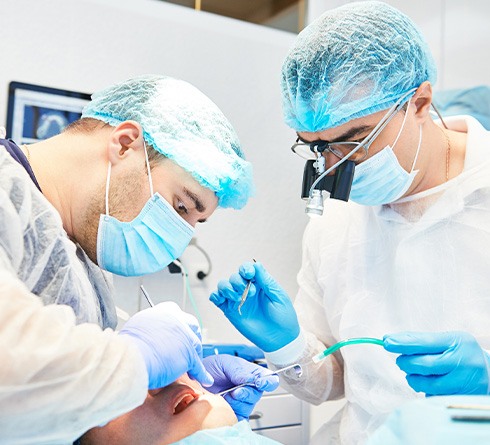
As a highly accomplished implant dentist and oral surgeon in Richardson, Dr. Ahn has placed thousands of implants throughout his career. He approaches this delicate procedure with a strong commitment to precision, patient comfort, and optimal outcomes.
The procedure itself is fairly straightforward. First, our team will make you comfortable with local anesthesia and/or sedation. Then, your surgeon will place your implants into your jawbone at their pre-planned locations. Any incisions are closed, and you can go home to start the healing process. Most patients are able to return to work within 1 – 2 days after their appointment.
Dental Implant Osseointegration & Abutment Placement
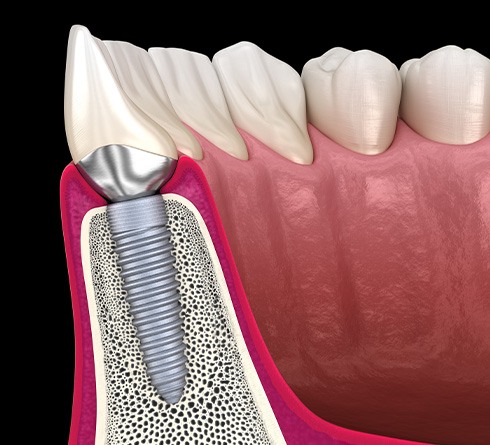
Osseointegration is the biological process that allows your jawbone to form a strong bond with your implants. Essentially, the tissue fuses with your new prosthetic tooth roots! This process can take several months to complete.
Once adequate osseointegration has occurred, you might have to undergo a second minor surgery. During this procedure, the tops of your implants will be exposed and healing caps will be placed on them. Later, the healing caps will be replaced by abutments, small connector pieces that will keep your restorations in place. (Some people receive abutments during their initial surgery, so this second procedure is not necessary in all cases.)
Delivery of Dental Implant Restorations

In order to design your dental implant restorations, your general dentist or prosthodontist should take detailed impressions of your dental arches. Those impressions will be used as the basis for designing your new crown, bridge or denture. Skilled technicians in a dental laboratory will fabricate your new teeth.
Once your restoration is ready, your care team will verify that it meets expectations. Then, it will be secured into place. And that’s it! You can go off and start to enjoy the many benefits of your rebuilt smile.
Benefits of Dental Implants

Over the last several years, dental implants have become one of the best and most popular forms of tooth replacement. This is because they offer several unique benefits that other, more traditional options can’t replicate. If you’re thinking about getting dental implants yourself, read more below. You’ll discover the powerful ways these modern marvels from Richardson Oral Surgery Center can restore your smile and improve your quality of life! If you think this treatment might be for you, contact us to schedule a consultation.
Day-to-Day Benefits

You use your teeth every day, and when you’re missing some of them it can be challenging to perform some basic tasks. Even smiling can become difficult! Here are some ways you’ll see improvements in your daily life:
- Restored Bite Power: Dental implants can restore most of your original bite force. This means you’ll be able to eat virtually any food you could with your original teeth.
- Easy Maintenance: You take care of your implant restorations just like you would your natural teeth, resulting in minimal change to your daily routine. Simply brush and floss daily and visit us for routine checkups and cleanings.
- Lifelike Appearance & Function: Enjoy a massive confidence boost with replacement teeth that are fully functional and blend seamlessly into your smile.
Health Benefits

Dental implants aren’t just for show—they also provide several benefits for your oral and bodily health! Here’s how dental implants can protect your mouth and your systemic functions:
- Preserved Jawbone Density: Because dental implants fuse with the jawbone, they’re able to provide stimulation to keep it from eroding with time. Dental implants are the only tooth replacement option that has this feature.
- Improved Nutrition & Digestion: Chewing is the first step in the digestive process and tooth loss can make it more challenging. Dental implants restore your chewing function, broadening your menu and calming your digestive tract.
- Reduced Risk of Oral Health Issues: As you lose teeth, your remaining pearly whites will begin shifting to pick up the slack. This leaves them vulnerable to damage, makes oral hygiene more difficult, and leads to jaw pain. Dental implants keep your teeth from shifting and support their alignment to prevent these issues.
Long-Term Benefits

Our dental implants are built to last and have a success rate of over 95 percent. This means that once you invest in them, you’ll be able to enjoy their benefits for a long time. Here’s what you can expect from your implants in the future:
- Smile for Life: Dental implants can last for decades or even a lifetime with proper care and maintenance. This will keep your smile vibrant and complete for many years to come!
- Stay Looking Youthful: As your jawbone deteriorates due to tooth loss and age, it can cause “facial collapse” where your jaw shrinks and the structure of your face weakens, leading to a sagging and hollow appearance. Dental implants prevent this by keeping your facial structure strong, keeping you looking younger!
- Save Money: While implants have a higher up-front cost than other tooth replacement options, your money stretches much further. Dentures, in particular, require frequent adjustments and replacements, costing you more over time.
Who Dental Implants Can Help
While there are certain situations in which dental implants may not be the ideal answer, many tooth loss cases in Richardson can be addressed with this leading-edge solution. In fact, it’s so versatile, it’s able to restore any number of missing teeth. Below are some of the treatment avenues that we may take to rebuild your smile.
Missing One Tooth

To replace a single tooth, we wouldn’t need to alter your existing dental structure. Instead, we could place one dental implant in the space in your arch and attach a free-standing dental crown to it. This will complete your smile as well as reduce your chances of risking further tooth loss.
Missing Multiple Teeth

To replace multiple individual teeth either in a row or throughout your smile, we can place an implant bridge and/or implant crowns. The implant bridge will be secured to two dental implants placed at either side of a gap in your smile left by two or more teeth. These will anchor the restoration into place so your natural teeth won’t have to.
Missing All of Your Teeth

Dr. Ahn offers both traditional implant dentures as well as All-On-4 dental implants in Richardson. Traditional implant dentures are secured within the mouth using anywhere from four to eight dental implants, while All-On-4 utilizes only four implant posts that are strategically placed in the densest areas of the jawbone. This reduces the need for preparatory procedures like bone grafts.
Learn More About Implant Dentures
Understanding the Cost of Dental Implants

Every dental implant treatment that we complete is custom-tailored to meet each patient’s individual needs. This means that each aspect of your surgery will be designed around your unique situation, like how many dental implants you need to have placed and whether you require preparatory treatments. Because of this, the cost of dental implants in Richardson can vary. You can learn more about these factors below.
Preliminary Treatments & Dental Implant Surgery

Patients that have certain facial anatomies or that have been missing teeth for quite some time may require preparatory treatments to make sure that their dental implant procedure is successful. These can include bone grafts, sinus lifts, or other surgical treatments that will be a separate cost apart from the dental implant surgery itself.
The Parts of Your Dental Implant
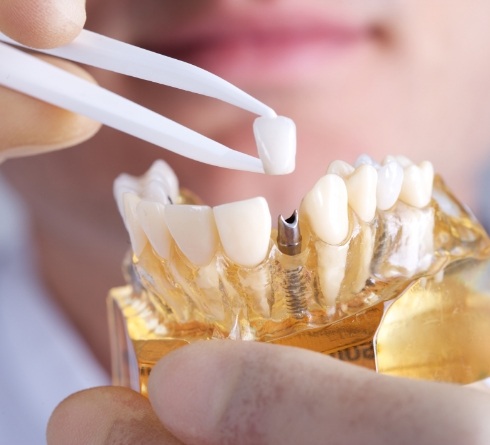
Dental implants come in different shapes, sizes, and can be crafted from different materials. Each of these factors can also impact the cost of your dental implant procedure, depending on what options you opt for. Dr. Ahn will discuss these details with you during your consultation, ensuring you understand the pros and cons for each as they relate to your situation, and tailoring your dental implants to meet your needs.
Final Dental Implant Restoration
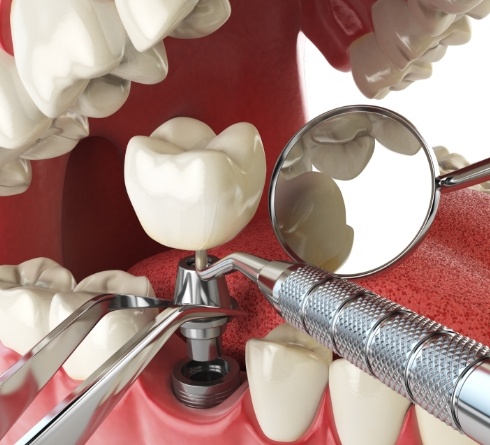
This aspect of your dental implant treatment will likely be discussed in greater detail with your general dentist, as they will be having your restoration crafted by a dental laboratory. Depending on how many teeth you’re missing, you may need a crown, bridge, or denture. Typically, the larger the restoration, the more costly it is.
Does Dental Insurance Cover Dental Implants?

While some dental insurance plans may cover a portion of the cost of your overall treatment, it’s rarely if ever the case that they will cover it completely. Because of this, we recommend that patients either have the funds together to pay for the treatment, or that they have financing organized. Our team is happy to help you submit insurance claims and navigate your benefits, so don’t hesitate to contact us with any cost-related questions you may have.
Making Dental Implants Affordable

If you need help accessing third-party financing or filing insurance claims with your provider, our team will be happy to assist you to make sure you’re able to afford your treatment.
Dental Implant Failure & Salvage
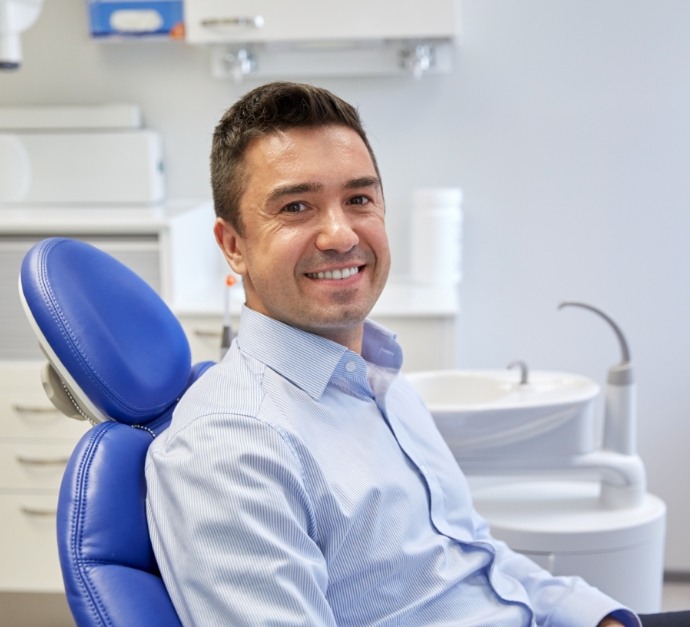
Dental implants boast an incredible success rate of 98% after five years of placement; however, if you have habits or conditions that could put you at a greater risk of failure, like gum disease and smoking, it’s crucial for you to keep an eye out for signs of failure. In these cases, Dr. Ahn and our team can help salvage your new and hard-earned smile. Simply give us a call to schedule an examination.
Dental Implant FAQs
Can I Take Implant Dentures Out?
Most designs of implant dentures are made to stay permanently affixed within the mouth, only being able to be removed by a dentist. This not only makes them feel and function like natural, but it also means you won’t have to worry about soaking them in water when you sleep or removing them to clean them.
Do Dental Implants Feel Natural?
A key difference that separates dental implants from traditional tooth replacement treatments is that they restore the roots of the missing teeth as well as the biting surface. This leads to natural-looking and feeling results.
Are Dental Implants Safe?
Although dental implants become popularized more recently, this treatment has decades of clinical research behind it that proves that it’s both an effective and safe way to replace missing teeth. In fact, studies have shown that after 10 years of placement, 95% of patients are able continue enjoying successful results.
At your initial consultation with Dr. Ahn, he will also discuss risk factors with you that could impact your treatment’s success. For example, if you have gum disease, diabetes, or have experienced jawbone deterioration, or you’re a smoker, these can all impact your final results by increasing your risk of dental implant failure. With that being said, our team will make sure to discuss these factors in detail with you so you can have successful results!
Can Dental Implants Get Cavities?
Implant restorations are crafted from artificial materials that look lifelike. This means that they can’t get cavities. However, without good dental hygiene, it is possible for gum infections to develop. This is why you’ll want to stay on top of your at-home oral hygiene routine and schedule your bi-annual checkups and cleanings with your general dentist.
Are Dental Implants an Eligible FSA Expense?
Dental implants are typically eligible for FSA reimbursement because the treatment is classified as restorative in nature and can improve dental health. However, you’ll want to keep in mind that many FSAs cap off how much money you’re able to use each year, so our team will be happy to help you coordinate your treatment to maximize your coverage.
Oral Surgery Sedation Dentistry Tooth Extractions View Our Services
